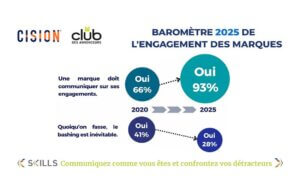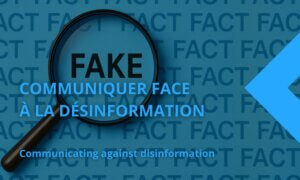The emergence of the Internet has placed digital marketing agencies at the heart of data analysis activities. Indeed, the explosion of online data offers unprecedented opportunities for understanding customers and anticipating market trends. Whether it’s data on consumer habits, comments on social networks or online performance tracking data, interactions on the web generate a wealth of actionable information.
How can we make the most of these interactions? And what methods do some digital marketing agencies use to make the most of it? By the end of this article, you’ll know our analysis and methods.
The importance of online data analysis for businesses
But first, we need to understand the importance of online data analysis for businesses. It’s all about identifying customer needs and trends in an increasingly competitive and hyper-connected marketplace.
Digital marketing agencies can offer enhanced customer insight
Online data analysis by a digital marketing agency well versed in the latest trends offers a company an in-depth understanding of its customers and market trends. Using advanced data analysis techniques such as machine learning and data mining, the digital marketing agency can identify customer patterns, preferences and behaviors. Its work will then enable it to anticipate needs, personalize offers and improve the customer experience.
For example, by analyzing transactions and spending habits, a bank can recommend relevant financial products to its customers. Online data analysis can also help the bank detect fraud and suspicious activity in real time. This enables the bank to react quickly to protect its customers’ accounts.
Online data analysis also enables market trends to be monitored and analyzed in real time. Companies can observe online comments, and detect emerging trends via keyword studies. This gives them a competitive edge, enabling them to adapt quickly to market developments and anticipate demand.
Advantages of digital marketing agency methods over traditional methods
So perhaps you’re thinking that these methods, or similar techniques, have been around for a while! The difference with the work carried out by a digital marketing agency is that, unlike traditional methods which are limited by restricted sampling or longer processing times, online data analysis offers both a complete and up-to-date view.
For example, a bank can benefit from online data analysis to obtain deeper insights and more reliable data concerning its customers’ asset class and or savings product consultations to better anticipate their investment capabilities…. These predictions could include the times and days when customers log on to the platform, as well as the duration of these connections. The bank can then choose these times to send them advertising emails, knowing that they will be more attentive than at other times.
Online data analysis is also highly scalable. Thanks to technologies such as cloud computing, companies can process very large quantities of data, without being limited by traditional storage and processing capacities.
What’s more, online data analysis offers greater accuracy and reliability of results. By using advanced algorithms, companies reduce the potential bias and errors inherent in traditional methods. Last but not least, this ability to analyze varied and complex sets of data results in deeper insights and more reliable predictions.
Let’s take a closer look at these online data analysis methods.
What are the methods used by digital marketing agencies?
The rise of machine learning to extract valuable information
Machine learning has revolutionized online data analysis. This approach enables digital marketing agencies to extract valuable information from vast data sets, through the use of sophisticated algorithms. Using machine learning, agencies can then identify hidden patterns and predict outcomes. This enables them to make decisions based on factual data.
For example, machine learning algorithms can be used to analyze customer preferences and thus, from experience, optimize online advertising campaigns. Google Ads and Meta, among others, use this approach to offer Internet users the ads they are most likely to like. Also, the performance of each tool can be precisely analyzed to focus advertising efforts on the most relevant channel, and with the most relevant ad.
Would you like to use these strategies to optimize your business? The experts at Skills Communication are here to help.
The importance of real-time analysis for rapid decision-making
Real-time analysis has become crucial for companies wishing to react quickly to market changes. It is used to instantly process online data, providing valuable information to guide agencies’ actions.
For example, social media platforms use real-time analysis to track and adapt to emerging trends.
Another example is a financial institution that uses real-time analytics to monitor transactions on its network and detect fraudulent activity on the spot.
The emergence of predictive analytics to anticipate future behavior
Predictive analysis is based on statistical models and machine learning techniques. It enables us to predict customer trends, preferences and behaviors. Unlike real-time analysis, it uses historical data to predict behavior and results. For example, companies can use predictive analytics to predict which products customers are likely to buy, in order to optimize their SEO accordingly. For example, a digital marketing agency might highlight that SEO work needs to be carried out on certain keywords, because of a future customer need.
By integrating these new trends in online data analysis, digital marketing agencies can fully exploit the potential of data to improve their clients’ performance and help them make informed decisions.
The limits and challenges of online data analysis
However, these new technologies brought by digital marketing agencies also bring their share of problems.
Data confidentiality, the main challenge for digital marketing agencies
The extremely sophisticated data analysis carried out by agencies and their many tools has led the European Commission to create the General Data Protection Regulation (GDPR), which strictly regulates the collection and use of data. In a way, this is proof of the effectiveness of the agencies’ work! But the use of data must now comply with several rules, on pain of heavy fines.
Data security: a growing vulnerability for businesses
Online data is vulnerable to cyber-attacks, hacking and security breaches. It is therefore crucial to implement robust security measures. This is to protect data against unauthorized access, information leakage and malicious manipulation.
Data quality
Data used in analysis must be reliable, accurate and complete to guarantee relevant results. Data quality challenges can include errors, duplicates, missing values or inconsistencies. It is therefore necessary to implement data quality control processes and data cleansing techniques to improve data reliability.
Are you interested in any of the services described in this article? We’ve got the experts to answer your questions!
Articles relatifs:
- Digital communication: the keys to success
- Community management: rules and best practices
- Develop a three-step digital strategy
- Which social networks should be used in companies and what precautions should be taken?
- Digital conferences, online debates: a good way to better capture your target audiences
- Content creation: human or AI?
- Your visibility on social media: how to grant influence and recognition?
- How to manage effective press relations today?
- The influence of leaders on social networks
- What brand content strategy to enhance your recognition?




